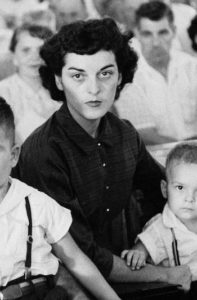
Carolyn Bryant
*The birth of Carolyn Bryant is affirmed on this date in 1934. She was a white-American store clerk, eyewitness, and plaintiff in the Emmett Till trial.
From Indianola, Mississippi, Carolyn Bryant Donham’s father was a plantation manager, and her mother was a nurse. A high school dropout, she won two beauty contests and married a World War II soldier, Roy Bryant. The couple had two children and ran a small grocery store, Bryant's Grocery & Meat Market, that sold provisions to Black sharecroppers and their children. In 1955, she worked at the store where young Till came to buy bubble gum. Shortly after exiting, he whistled at Her; young Till was visiting family from Chicago and was unaware of the cultural rules of racial segregation in the South. Indianola was the home of the White Citizens Council.
Enraged, her husband and another man abducted him three nights later, bludgeoned, shot, and murdered the young boy. Timothy Tyson, a Duke University senior research scholar, reveals that in 2007, at age 72, Bryant confessed that she had fabricated the most sensational part of her testimony. “That part’s not true,” she told Tyson about her claim that Till had made verbal and physical advances on her. As for the rest of what happened that evening in the country store, she said she couldn’t remember. (Carolyn is now 86, and her family has kept her current whereabouts secret.) Carolyn had approached Tyson because she was writing her memoirs. (According to Tyson, her manuscript is in the Southern Historical Collection at the University of North Carolina Chapel Hill library archives and will not be available for public view until 2036.
But as Carolyn became reflective in Timothy Tyson’s presence, wistfully volunteering, “Nothing that boy did could ever justify what happened to him.” She also admitted she “felt tender sorrow,” Tyson would note, “for Mamie Till-Mobley”—Emmett Till’s mother, who died in 2003 after a lifetime crusading for civil rights. (She had bravely insisted that her son’s casket remain open at his funeral to show America what had been done to him.) “When Carolyn [later] lost one of her sons, she thought about the grief Mamie must have felt and grieved all the more.”
Tyson does not say whether Carolyn was expressing guilt. Indeed, he asserts that for days after the murders and until the trial, her husband’s family kept her in seclusion. But that “tender sorrow” does sound, in its way, like late-blooming regret. Carolyn Bryant died on April 27, 2023.